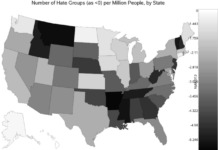On October 15, Doug David, a 64-year-old resident of La Jolla, and frequent visitor to New Orleans was beaten and left paralyzed from the neck down after he was assaulted in busy tourist neighborhood. But it wasn’t until a full 10 days later that the New Orleans Police Department came to the hospital to interview David about the incident. Indeed, until then, no police report whatsoever had been filled, in spite of 911 emergency calls from witnesses and the presence of the New Orleans Fire Department and EMS at the scene.

The reason? According to EMS reports obtained by the The Times of San Diego, the initial 911 call was placed at 11:09 p.m., and an ambulance reached the scene at 11:16 p.m. But it wasn’t until 11:49 p.m. that an NOPD officer reached the scene. By then, there was no scene, no victim, no suspect, and nothing to report. The police officer left and marked the incident as “unfounded.”
The horrific incident highlights a growing problem in New Orleans, one that is all too well known to residents and law enforcement; the understaffed NOPD’s response times are growing, and pose an additional threat to the crime-ridden city. According to an analysis by WVUE Fox 8 News:
“The average time for an officer to be dispatched to a call for service in New Orleans has risen to 73 minutes this year, or nearly four times the 15 minutes it took on average in 2011.”
The NOPD has long been plagued by issues that range from corruption to constitutional violations. In 2013 the U.S. Department of Justice proposed a consent decree that would require, among other things, greater oversight, consistent use of body cameras and full and detailed reports from officers. The consent decree went into effect that year. The measures contained within are vital to reform in the NOPD, and were–initially–supported by Mayor Mitch Landrieu.
But a beleaguered police department in the midst of transition and operating under federal oversight it, it appears, is not the most appealing of places to work. In 2011, the city had 1,424 commissioned officers. By August of this year that number had dropped 1,137. Under the consent decree fewer officers are doing even less work. As an anonymous panel of NOPD officers explained to NOLA.com:
“There needs to be some oversight… But they’ve taken it way too far. There was a day that cops loved to be efficient… But today, some figure, ‘I can try to handle 13 calls in a shift or I can be caught out on two domestic disputes that take up my entire shift,’ and I’m going to get paid the same.”
As a result, a man who beat a 64-year-old until paralyzed can walk away from the crime scene, and remain completely unknown to law enforcement for a full 10 days after the event. While there is clearly no desire to return to the days of deep NOPD corruption, the current state leaves the city with one major question: who, exactly, can keep the streets of New Orleans safe?




